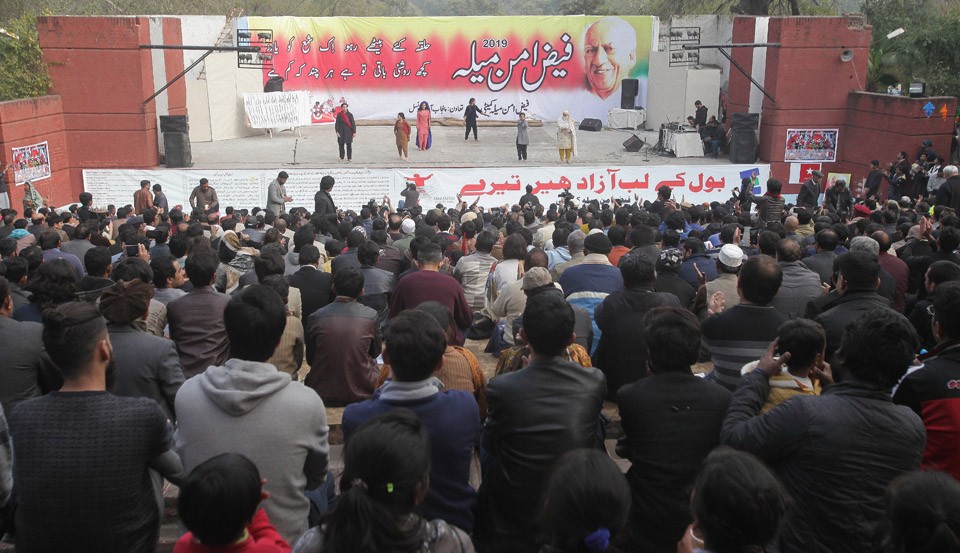
As winter transitions to spring, Faiz Aman Mela rejuvenates the message of social emancipation, reminding the deprived people to work for the recovery of their rightful position

Faiz Aman Mela, a congregation for Faiz Ahmed Faiz and his progressive thoughts, hoisted the anti-imperialist and pro-communist spirit once again on the late poet’s 108th birth anniversary at the usual venue -- Open Air Theatre at Bagh-e-Jinnah -- on Sunday, February 17.
As winter transitions to spring, Faiz Aman Mela rejuvenates the message of social emancipation, reminding the deprived people to work for the recovery of their rightful position.
Since 1987, political activists, trade unionists, literature enthusiast, workers and students alike have assembled to revive and promulgate Faiz’s ideology through poetry, music and theatre. This year a crowd of over 10,000 at different times of the day, splotched with red flags and radical voices, gathered to illustrate its stance against the hierarchies of a class-based society and the constraints it puts on speech, thought and action.
The festival, instituted by Faiz Aman Mela Committee, commenced with the recitation of Faiz’s "Tarana" (Anthem) dedicated to the proletariat struggle, establishing the themes of protest against social injustice and disparities as constants for the rest of the evening.
The event, segmented into four sessions, started with a debate titled, "class-based education," where panelists including Raza Gilani, Mohiba Ahmed, Haider Butt, Aimen Bucha and Muzzamal Khan contested the sociological causes for inequality in education and instigated a spirit of protest, rebellion and sacrifice against bureaucracy and bourgeois hegemony that has come to dominate the education system of Pakistan.
Dr Ammar Ali Jan initiated the dialogue by stating how the contemporary education system has been parsed by political, economic and social disparities, which impede the acquisition of knowledge. Further, the curricula are censored to provide mechanised and pre-structured narratives. Of the educated youth, who manage to survive the system, the majority struggles to find its place in the neo-liberalist society, creating a youth bulge that leads to restlessness among the masses. Dr Jan quoted Rawal Asad, a student of Emerson College, Multan who was jailed over sedition charges for participating in a protest against the murder of Pashtun activist Arman Loni in Loralai, as an example of resistance against class conflict.
Panelist Mohiba Ahmed commanded the attention of the audience by protesting against the neglect of incidents of sexual harassment and the non-implementation of Higher Education Commission’s (HEC) policy against sexual harassment in educational institutions. Aimen Bucha provided the perspective of teachers on the divided education system, and expressed sentiments of helplessness at being subjugated to the same discriminatory system.
Pashtun student activist Muzzamil Khan expressed the monopolised education system as "the recurrent display of the same colonisation that we struggled to escape." He claimed that Pashtun and Baloch students are first-hand witnesses of the unbridled prejudices that mar the educational institutions of Pakistan.
The fiery dialogue drew parallels between the working-class labourer from Faiz’s poetry and the contemporary student, who is a victim of the same capitalistic propaganda that favours the uneven distribution of resources. Chanting the need for revolution, the participants of Faiz Aman Mela acted no less than harbingers of the progressive movement in Pakistan.
The second session included classical dance and theatre performances where groups like Laal Hartaal extracted archetypes of a struggling man from Faiz’s poetry and related it to women oppression in a capitalistic culture.
Following this, the mushaira session filled the late-winter sunset with rhythms of famous poems like "hum jo tareek rahon main maray gai," highlighting that the spirit of resistance will recycle and relive through generations. Famous poets Baba Najmi, Dr Khalid Javed Jan, Khalid Mansoor and others participated in the mushaira.
The Mela concluded as always with music. Jawad Ahmad, Laal Band, Adeel Barki, Inayat Abid, Tarannum Naz and Nida Faiz superimposed similar messages in their music.
Faiz Aman Mela does much more than celebrating a poet; it celebrates the people who mattered so much to the poet. From the Tanga March used to advertise the event to subsidised food, it retains and represents the unadulterated culture and tradition of the labour class. Dissociated from hugely funded organisations and international media, it is an event by the people for the people. Here, socio-economic barriers breaks, chains become weapons and whispers become voices that rally for the same proletariat revolution that permeates Faiz’s poetry.